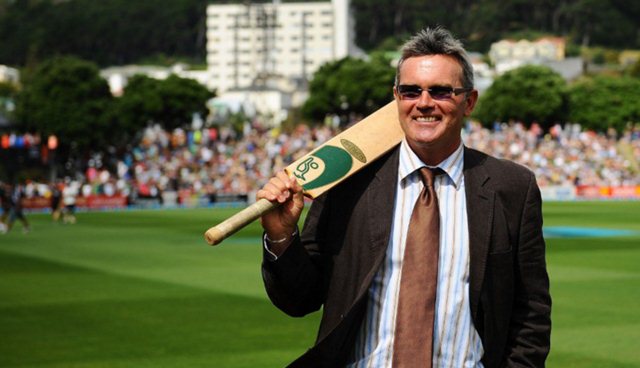A cocktail of grace and elegance: Martin Crowe
4 Min Read


The Cornwall Cricket club, situated a few miles within the dense suburbs of Auckland is the heartbeat of New Zealand Cricket. The club, boasting of nothing more than a building and a cricket ground is a friendly setting for a weekend match. Beer, fish ‘n’ chips, young lads with bright futures and the pine trees surrounding the area makes it a perfect place to play a game of cricket.
Martin Crowe’s roots tread back to the walls of the Cornwall Cricket Club. His father Dave, his brother Jeff and several others of his family had treated the club, quite virtually as their monastery. A well-built young lad, rugged forearms, powerful legs and brown hair intertwined in curls, Martin basked in glory under the warm sunshine of the Cornwall wicket. So much did he enjoy the conditions, that the records board at Cornwall took a pounding each time he went out to bat.
It wasn’t before long that the impressive Martin Crowe had caught the attention of the stuffed shirts at the New Zealand cricket board. The selectors, in their infinite wisdom, held onto their powers, deciding to give Crowe time to mature. The following domestic season proved to be child’s play for the irresistible Crowe as he was crowned ‘New Zealand’s Young Cricketer of the Year’.
The doldrums and the fanfare of the ‘next big thing’ in world cricket found its way to the secure and impregnable doors of the Marylebone Cricket Club. While the law books of the ‘Supreme Court’ of world cricket at the time remained to restrict the actions of the enforcers, an exception was made in the case of Martin Crowe. Donning the all-whites of the MCC at the Lord’s Cricket Ground beckoned for 17-year-old Martin.
His performances finally saw the selectors pick him for the national side. He joined the side captained by older brother Jeff Crowe. While cousin Russell Crowe was making it big in Hollywood, Martin Crowe broke into the national side for the Trans-Tasman trophy in 1982. The Basin Reserve might have churned out a draw for the hosts, but for Martin, it was a severe blow that brought him crashing back to planet earth.
Crowe’s baptism of fire saw him face up to Jeff ‘Tommo’ Thomson, Dennis Lillie and Terry Alderman. As he recounted later, it was the fastest he’d ever faced. He was soon dismissed after failing to make an impact. Rain saved the Kiwis as they looked destined for a humiliating loss.
Perhaps, my only regret as a cricket fan is not watching the likes of Martin Crowe bat. The plethora of highlight packages on youtube do very little to help me understand the man beyond the fours and sixes shown. Repeated conversations with the previous generation help me realize to an extent the meticulousness with which he carried out his batting.
An article from a man who knew him well, Gideon Haigh finally quenched my inquisitiveness. While the description was top class, the emotion it brought was gigantic. The Woolloongabba 30 years ago was the setting for Martin Crowe to prove his worth. Apart from Richard Hadlee leading his team to their first ever series win over Australia, a standout performance from Martin Crowe stole the show. Facing up to the terrifying pace of Geoff Lawson and Craig McDermott, Crowe batted for eight long hours. En route to a gritty 188, he was struck multiple times on the body.
Haigh goes on to describe. “I can see him now – tight, upright, playing pedantically in the V, the sleeves buttoned to the wrists, the distinctive white headband beneath the distinctive white helmet, as understated and soaringly magnificent as a Doric column. Martin’s one little touch of flamboyance was his penchant for the hook, which he played fearlessly, despite eschewing a face guard on his helmet. In Christchurch, a few months after Brisbane, he retired, bloodied and groggy, after a blow to the jaw from Bruce Reid.”
One of the most emotional incidents in cricket history I have ever seen came during his induction to the ICC Hall of Fame in the 2015 World Cup. I never got a chance to see the ceremony on television, but what happened during the mid-innings analysis nearly moved me to tears.
Shane Warne stepped out of his commentary position to go and shake the hand of Martin who was making his way back towards the pavilion following the ceremony. I have been told by many that there will never be another like him. Although it saddens me, part of me remains happy when most batsmen of the modern era are compared to him. Martin Crowe, in a nutshell, became the standard by which New Zealand batsmanship would be measured.
All that you need to know about Martin Crowe – 13 Interesting facts about Martin Crowe – The greatest New Zealand batsman
Download Our App